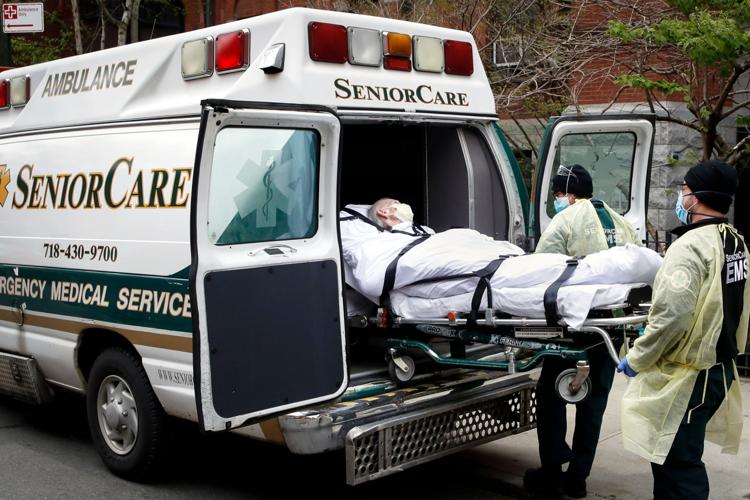Op-Ed: Illinois can’t fight the COVID-19 nursing home crisis alone, Congress must act

A patient is loaded into an ambulance by emergency medical workers April 17, 2020, outside Cobble Hill Health Center in the Brooklyn borough of New York. The nursing home has seen multiple deaths from the coronavirus outbreak.
COVID-19 is spreading like wildfire through the nation’s nursing homes. Already, more than 56,000 residents and staff of nursing homes and other long-term care facilities – including nearly 4,000 in Illinois – have died from COVID-19. They account for more than 44 percent of U.S. coronavirus deaths, even though less than one percent of Americans live in nursing homes. It is a national disgrace, deeply felt by real Illinois residents.
To date, Congress has passed four bills to address the devastating impact of coronavirus on Americans. Yet, these bills barely touch on the crisis raging in long-term care facilities. With only a few weeks until the district work period in August, what will it take for Congress to take meaningful action to protect nursing home residents?
For five months, nursing homes have been a hotbed for the virus – yet basic precautions to protect residents and staff are still not in place. AARP has heard gut-wrenching accounts from thousands of family members worried about their loved ones in nursing homes and other long-term care facilities.
AARP Illinois has heard from more than 100 families of nursing home residents about the neglect their loved ones have experienced.
People like Melissa Rowley from Chicago, who was not able to visit her cousin before she died in a long-term care facility from COVID-19. Rowley lives with the anguish of wishing she could have communicated with her cousin in person, even just to say goodbye.
Or Robert Iovinelli, 65, from Lombard, who is fighting every day to transfer out of a long-term care facility that was widely reported to have a high number of cases early on in this pandemic. Iovinelli hasn’t seen his family since Christmas. His facility has terminated even outdoor visits without offering any virtual alternatives. With high staff turnover and poor transparency, Iovinelli worries about falling ill and never having the opportunity to see his family again.
It’s time for lawmakers to come together to pass a bipartisan COVID-19 response package with dedicated funding and five key policies to protect older adults living in nursing homes and other long-term care facilities:
- Ensure regular, ongoing testing and adequate personal protective equipment (PPE).
- Create transparency focused on daily, public reporting of cases and deaths in facilities, communication with families when loved ones are discharged or transferred, and accountability for how billions of dollars in federal funding is spent.
- Require access to facilitated virtual visitation.
- Provide better care for residents through adequate staffing, oversight, and access to in-person formal advocates, called long-term care ombudsmen.
- Stop attempts to provide blanket immunity for long-term care facilities related to COVID-19.
The hopeful news is that legislation has been introduced in Congress that will help save the lives of nursing home residents. However, what remains missing is the will to make these older Americans and their families a priority.
Our elected leaders must act now to protect Illinois’ long-term care residents and staff before the death toll rises even higher. It is literally a matter of life or death.

